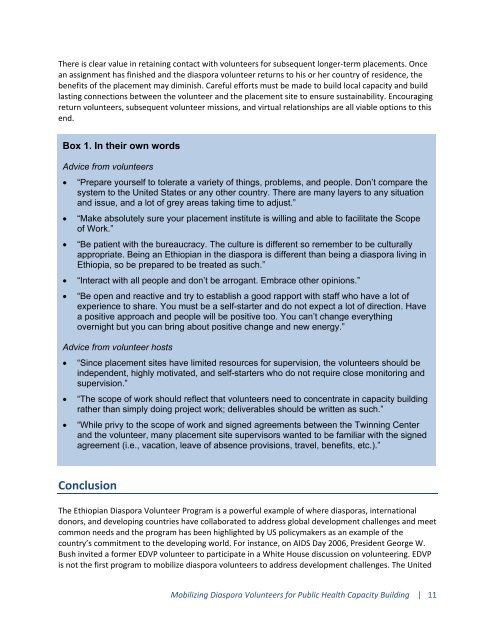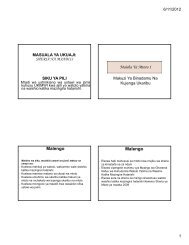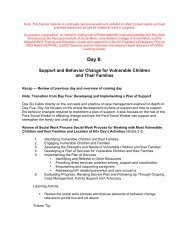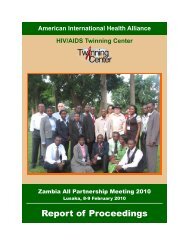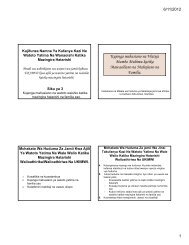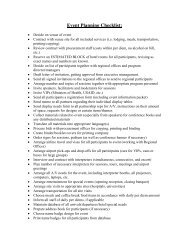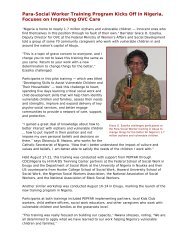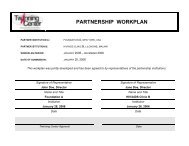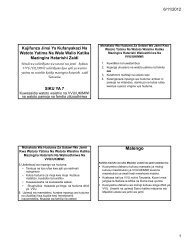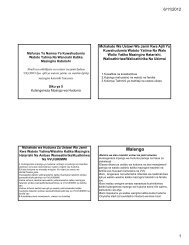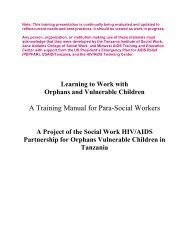Mobilizing Diaspora Volunteers for Public Health Capacity Building
Mobilizing Diaspora Volunteers for Public Health Capacity Building
Mobilizing Diaspora Volunteers for Public Health Capacity Building
Create successful ePaper yourself
Turn your PDF publications into a flip-book with our unique Google optimized e-Paper software.
There is clear value in retaining contact with volunteers <strong>for</strong> subsequent longer‐term placements. Once<br />
an assignment has finished and the diaspora volunteer returns to his or her country of residence, the<br />
benefits of the placement may diminish. Careful ef<strong>for</strong>ts must be made to build local capacity and build<br />
lasting connections between the volunteer and the placement site to ensure sustainability. Encouraging<br />
return volunteers, subsequent volunteer missions, and virtual relationships are all viable options to this<br />
end.<br />
Box 1. In their own words<br />
Advice from volunteers<br />
<br />
<br />
<br />
<br />
<br />
“Prepare yourself to tolerate a variety of things, problems, and people. Don’t compare the<br />
system to the United States or any other country. There are many layers to any situation<br />
and issue, and a lot of grey areas taking time to adjust.”<br />
“Make absolutely sure your placement institute is willing and able to facilitate the Scope<br />
of Work.”<br />
“Be patient with the bureaucracy. The culture is different so remember to be culturally<br />
appropriate. Being an Ethiopian in the diaspora is different than being a diaspora living in<br />
Ethiopia, so be prepared to be treated as such.”<br />
“Interact with all people and don’t be arrogant. Embrace other opinions.”<br />
“Be open and reactive and try to establish a good rapport with staff who have a lot of<br />
experience to share. You must be a self-starter and do not expect a lot of direction. Have<br />
a positive approach and people will be positive too. You can’t change everything<br />
overnight but you can bring about positive change and new energy.”<br />
Advice from volunteer hosts<br />
<br />
<br />
<br />
“Since placement sites have limited resources <strong>for</strong> supervision, the volunteers should be<br />
independent, highly motivated, and self-starters who do not require close monitoring and<br />
supervision.”<br />
“The scope of work should reflect that volunteers need to concentrate in capacity building<br />
rather than simply doing project work; deliverables should be written as such.”<br />
“While privy to the scope of work and signed agreements between the Twinning Center<br />
and the volunteer, many placement site supervisors wanted to be familiar with the signed<br />
agreement (i.e., vacation, leave of absence provisions, travel, benefits, etc.).”<br />
Conclusion<br />
The Ethiopian <strong>Diaspora</strong> Volunteer Program is a powerful example of where diasporas, international<br />
donors, and developing countries have collaborated to address global development challenges and meet<br />
common needs and the program has been highlighted by US policymakers as an example of the<br />
country’s commitment to the developing world. For instance, on AIDS Day 2006, President George W.<br />
Bush invited a <strong>for</strong>mer EDVP volunteer to participate in a White House discussion on volunteering. EDVP<br />
is not the first program to mobilize diaspora volunteers to address development challenges. The United<br />
<strong>Mobilizing</strong> <strong>Diaspora</strong> <strong>Volunteers</strong> <strong>for</strong> <strong>Public</strong> <strong>Health</strong> <strong>Capacity</strong> <strong>Building</strong> | 11


